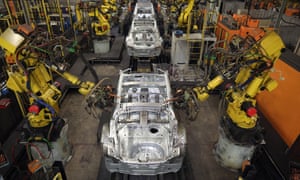Nissan
Plummeting diesel sales deal another employment blow to the UK automotive industry

Nissan would not confirm any job losses, although local reports suggested long-serving staff could be asked to take voluntary redundancy.
Photograph: Christopher Furlong/Getty Images
Nissan is to cut hundreds of jobs at its Sunderland plant, Britain’s biggest car factory, as plummeting diesel sales dealt another employment blow to the UK automotive industry.
The manufacturer would not confirm any job losses, although local reports suggested long-serving staff could be asked to take voluntary redundancy. The Unite union said it had been assured there would be no compulsory redundancies at the site, which employs 7,000 people. A source with knowledge of the situation said “hundreds” of jobs were likely to go at Sunderland, which makes Nissan’s Qashqai and Juke models, as well as the electric Leaf.
Nissan sales in Britain have fallen by more than a third so far in 2018, a substantial drop even in a dismal year for the industry, where overall demand has declined by 12%. European sales figures released this week showed Nissan, which exports eight out of 10 of its UK-made cars, had sold only 75,000 vehicles across the continent in March, down from 91,000 in the same month in 2017. Across the UK car industry, diesel sales have dropped by a third this year.
Nissan said that the job cuts would be short-term as it prepared to build versions of its Qashqi, Juke, Infinity and the new X-Trail using new technology.
A spokeswoman said: “As previously communicated, we are transitioning to a new range of powertrains over the next year. As we make the operational changes required to support this, we will be managing a planned short-term reduction in powertrain supply and plant volumes in line with our 2018 business plan. We are now discussing these operational changes with our employees.”
Steve Bush, a Unite official, said: “Unite has been assured that any job reductions will be on a voluntary basis and on enhanced terms.
“Over the coming weeks, we will be giving our members maximum support and ensuring that they can make informed choices about their future. We expect to see temporary workers at the plant move into permanent positions as volumes pick up again in future years.”
The Nissan spokeswoman said the move was “absolutely nothing to do with Brexit. We do expect volumes to increase again”.
Last week, Jaguar Land Rover said it would be cutting around 1,000 jobs and reducing the output of two of its factories in the West Midlands, a decision it attributed to the “continuing headwinds” affecting the industry, namely Brexit and diesel. JLR’s sales across Europe have fallen proportionately more than Nissan’s in the past year, down from 45,000 to 35,000 this March.
Also last week, Vauxhall said it was terminating the contracts of all its 326 dealerships in Britain – which employ 12,000 people – amid falling sales, including diesel cars, although it said it did not expect heavy job losses from the move.
The motor industry has repeatedly warned that Brexit uncertainty would lead to reduced investment and production decisions being deferred. However, Nissan was one of the first manufacturers after the referendum to announce it would continue to make new models in Britain, despite industry fears over tariffs and frictionless trade with Europe.
The Society of Motor Manufacturers and Traders has blamed the sharp drop in sales partly on what it describes as the “demonisation” of diesel and government tax policy deterring consumers from buying new diesels.
A small tax increase on diesels that came into force this month appears to have signalled the fuel’s fall from favour, as concerns over air quality have come to the fore.
Restrictions on diesels are expected to be be brought in for several cities in Britain, along with outright bans in some European urban areas, within the next five to seven years.
David Bailey, a professor of industrial strategy at Aston University, said: “Certainly there is a massive shift away from diesels across Europe. There is a perfect storm combining dieselgate, legislative changes and the reduction in resale values for owners of the cars.
“Nissan are exposed to that, as about 25% of what Nissan produce up in Sunderland is diesel. But they have a lot of hybrid technology after the takeover of Mitsubishi which we can expect to see more of, as well as the electric technology behind the Leaf, so I think they are well positioned to see through this temporary shock.”